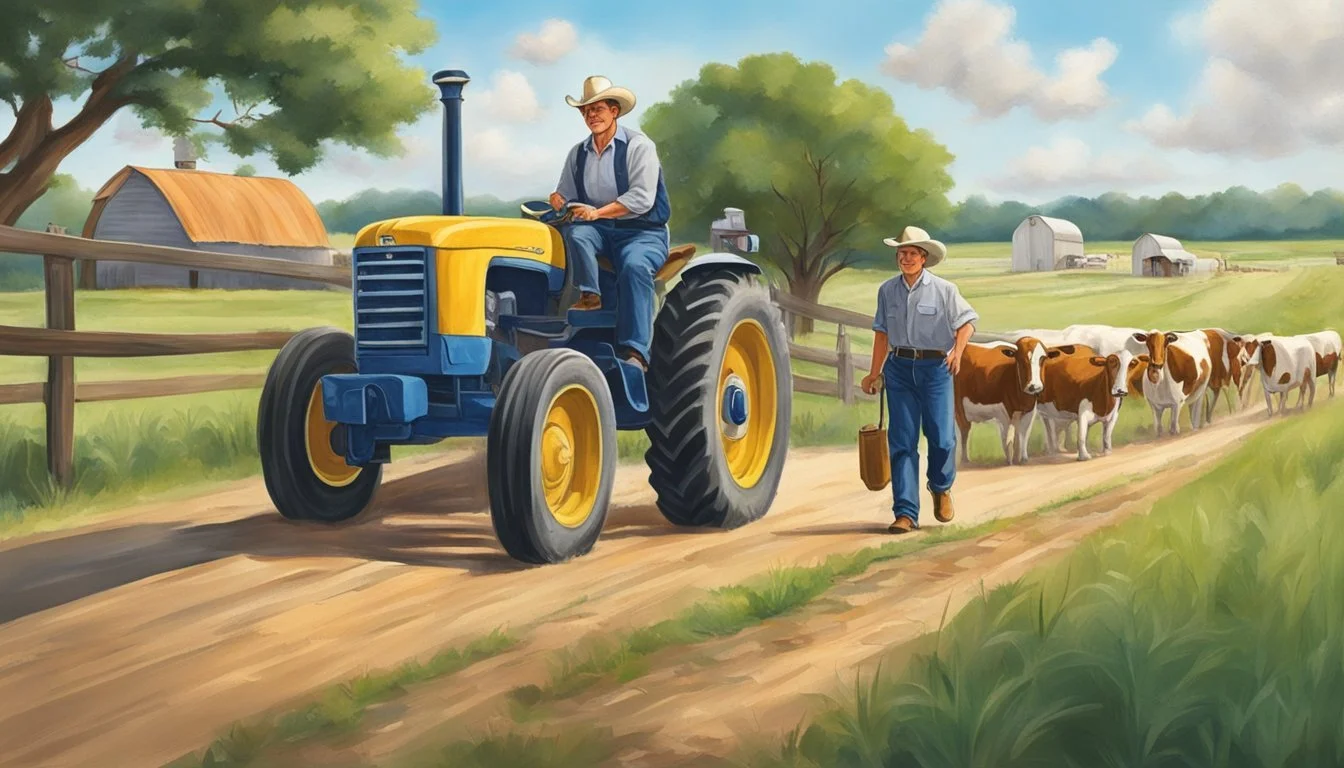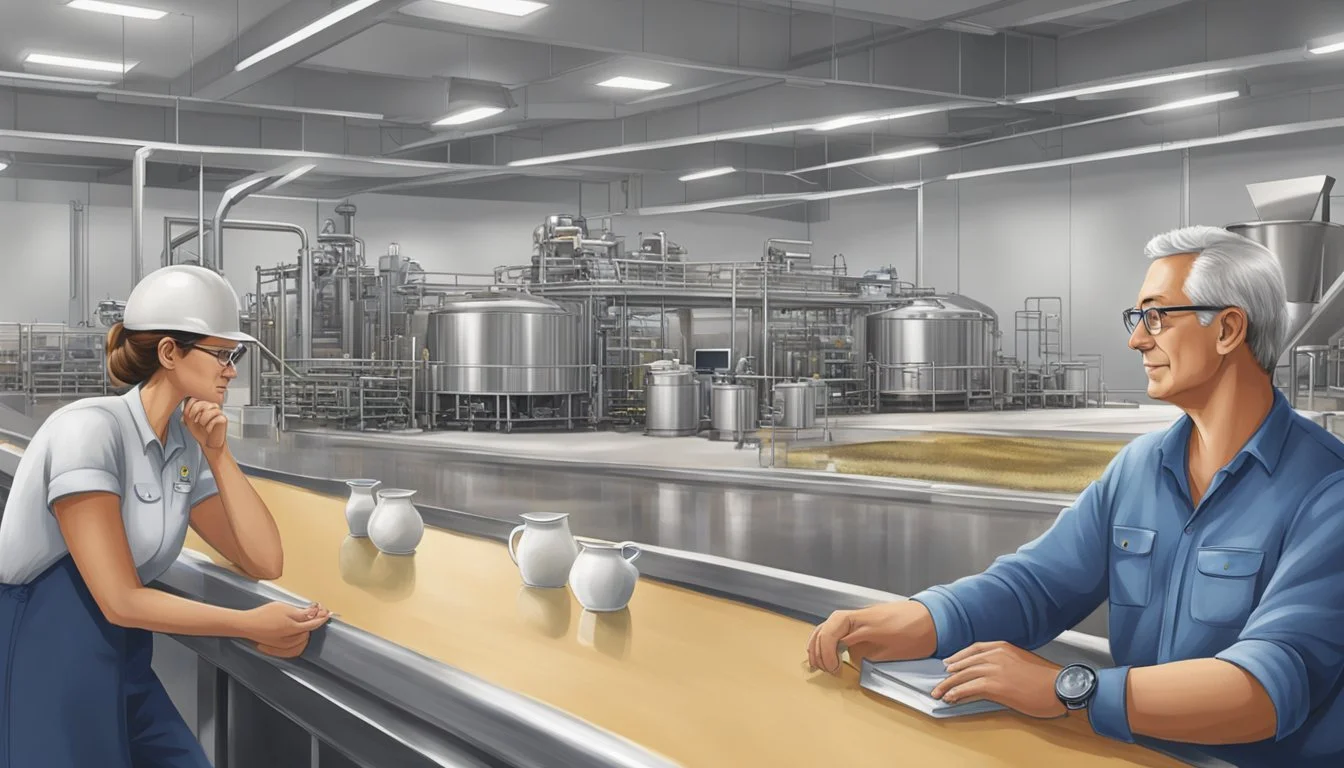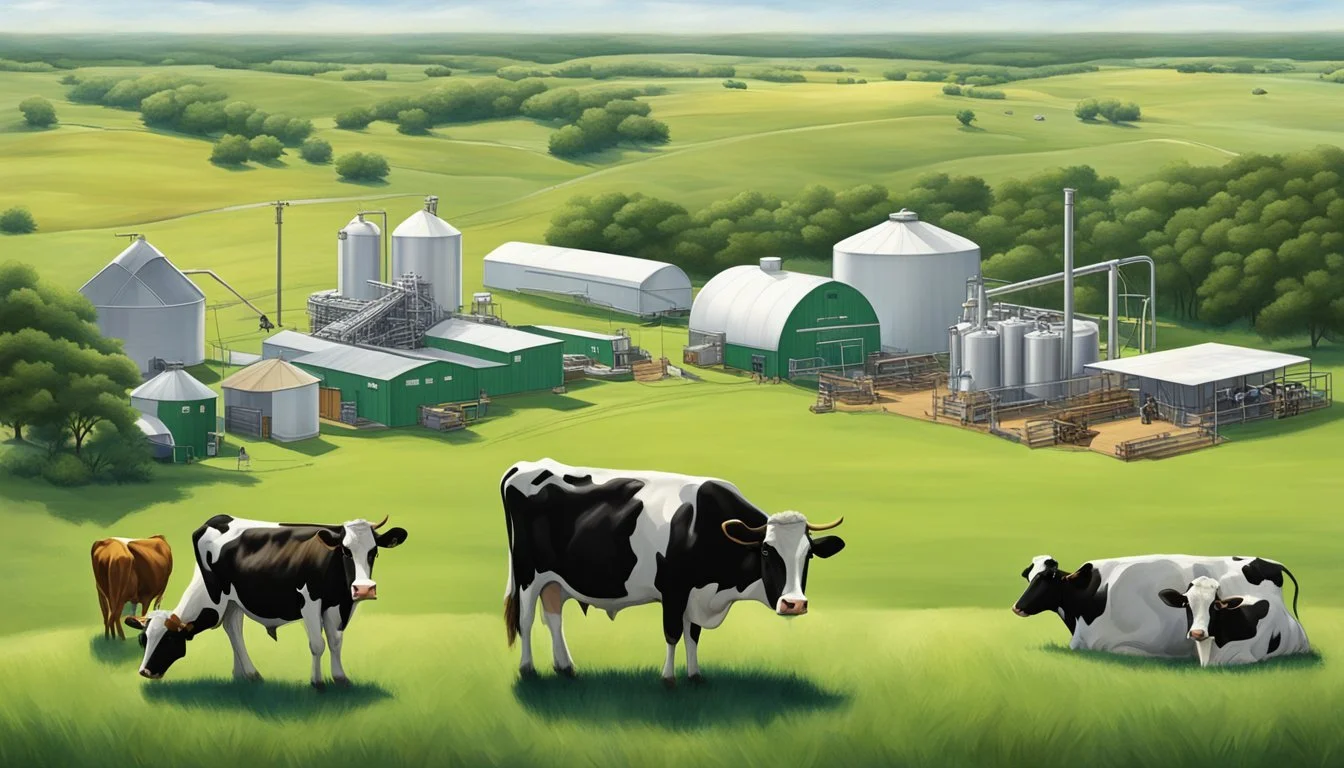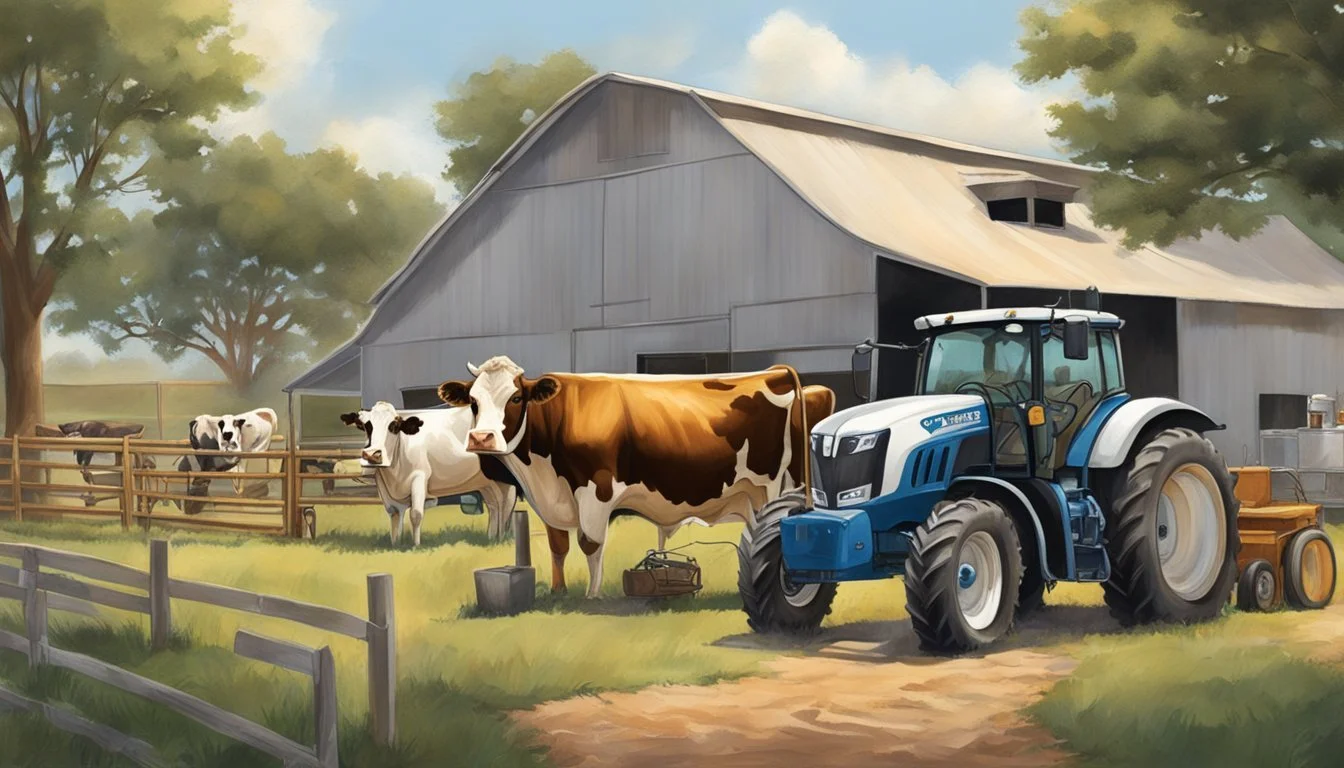The Role of German Texans in Shaping the Texas Dairy Industry Landscape
The Texas dairy industry, with its roots deeply embedded in the state's rich agricultural history, has been significantly shaped by the contributions of German immigrants. These settlers from the mid-19th century onward brought with them a wealth of knowledge and traditions in dairy farming, which they seamlessly integrated into the Texan agricultural tapestry. Their influence is evident in the thriving dairy sector that continues to serve not only the state of Texas but also supplies a substantial amount of dairy products to adjacent states.
German Texans have been central to the development of the dairy industry through their commitment to quality and efficiency. Their arrival coincided with a period of rapid agricultural expansion in Texas. By establishing a strong dairy farming culture, they set high standards for milk production and animal husbandry that resonate in the industry to this day. This dedication has helped the sector adapt and sustain growth, ensuring the production of over 150 million gallons of milk each month, a testament to the robust infrastructure they helped establish.
In contemporary times, the legacy of German influence extends beyond production into the very identity of Texan dairy. Towns like New Braunfels, which was established by Prince Carl of Solms-Braunfels, continue to celebrate and maintain Germanic traditions, enriching the cultural landscape of Texas. The fusion of German heritage with local customs has given rise to a distinct dairy industry that acknowledges its past even as it progresses towards a dynamic future.
Historical Development of the Texas Dairy Industry
Throughout the history of Texas, German immigrants and their descendants played a significant role in the development of the dairy industry, evolving from subsistence practices to a specialized and important sector of the agricultural economy.
Early German Contributions
German settlers brought with them knowledge of dairy farming, which they integrated into their new environment in Texas during the 1800s. Initially, the industry was largely a subsistence activity, with most families owning a few cows for their own milk, butter, and cheese needs. The first permanent German settlement in Texas, the City of Industry, established in 1831, represents the beginnings of German influence on local agriculture and dairying techniques.
Expansion During and After World War I
World War I marked a period of tension for German-Texans, many of whom faced severe scrutiny. Despite this, they fervently supported the war effort, with some even attempting to purchase Liberty Bonds despite the risk of persecution. The dairy industry in Texas saw growth during this period, as the demand for dairy products increased and factors such as the Kaiser Verein, an organization supporting German heritage, played a subtler role in maintaining cultural traditions and supporting the community in inclusive economic participation.
Modernization and Transformation
By the 20th century, the Texas dairy industry began shifting away from small-scale, farm-based operations to more specialized cheese manufacturing enterprises. Technological advancements and the need for efficiency and better production methods led to the modernization of the industry. Throughout this transformation, German-Texans remained influential in adopting and promoting these advancements, continuing to hold significant positions within the industry and contributing to the development of a robust dairy sector in Texas.
Economic and Market Dynamics
The dairy industry in Texas, significantly influenced by German Texans, stands as a testament to their enduring impact, where market dynamics and economic contributions intertwine.
Market Influence on Dairy Products
German Texans have played a pivotal role in shaping the Texas dairy market. Their expertise in milk production and dairy farming has led to the availability of a variety of high-quality dairy products. These products often cater to both local preferences and a broader market. Milk, cheese, and yogurt from Texan dairy farms are staples in regional diets and have a presence in national supply chains. Market demand consistently influences the type and volume of dairy products produced.
Impact of Dairy Farming on Local Economy
The contribution of dairy farming to the local economy is substantial. It provides employment across several sectors, from the dairy farmers themselves to distributors and retailers. Economic impact analyses showcase that the growth of dairy farms, many of which are run by families with German roots, bolsters local communities through job creation and associated spending. Moreover, these dairy farms contribute to the overall state economy through tax revenues and the multiplier effect, where increased milk production and related activities lead to further economic activities and growth.
Geographical Significance
German Texans have been influential in establishing Texas as a central figure in the United States dairy industry. This can be primarily attributed to the significant dairy-farming regions in the state where they have settled and contributed to the industry's development and success.
Internationally Recognized Dairy Regions
German immigrants to Texas brought with them skilled dairy farming techniques that have helped Texas become home to internationally acclaimed dairy regions. Among these, Central Texas stands out as an area where German influence on dairy farming is most evident. The locale's climate, topography, and soil conditions are favorable to dairy farming, a legacy that continues to this day.
Panhandle: The Heart of Texas Dairy
The Texas Panhandle is the powerhouse of Texas dairy production, strategically important due to the presence of major cities like Amarillo and Lubbock. The region benefits from its proximity to large processing facilities and feedlots. Moreover, its border with New Mexico has facilitated regional cooperation in the dairy sector. This geographical advantage has contributed to the Panhandle's reputation as the heart of the Texas dairy industry.
Legislation and Regulation
The Texas dairy industry operates under a framework of legislation and regulation that both supports and governs its operations. Critical to this framework are the efforts of the Texas Legislature in enacting dairy-specific laws and the Texas Association of Dairymen (TAD) in advocating for and guiding the industry through various legislative challenges.
Texas Legislature and Dairy Laws
The Texas Legislature has passed a variety of laws aiming to regulate and support the state's dairy industry. These laws have been instrumental in establishing standards for milk quality, animal health, and farm conditions. Specific legislation also includes measures for dealing with dairy-related diseases and the licensing of dairy farms and processing facilities.
Milk Quality Standards: aimed at ensuring that milk and dairy products are safe for consumption.
Animal Health Regulations: focused on preventing and managing diseases within dairy herds.
Licensing Requirements: for the operation of dairy farms and processing plants, to maintain industry standards.
Role of Texas Association of Dairymen (TAD)
The Texas Association of Dairymen (TAD) serves as a key organization within the industry, representing its interests at the legislative level. TAD's involvement is multifaceted: they monitor legislative developments, lobby on behalf of dairy producers, and provide members with information and guidance.
TAD's efforts include:
Lobbying: advocating for fair legislation and regulations that benefit Texas dairymen.
Information Dissemination: keeping members informed about legislative changes and their implications.
By playing a crucial role in both the creation and interpretation of dairy laws, TAD helps to ensure that the industry's interests are well-represented and that producers are able to maintain compliance with evolving legislative requirements.
Technological Advancements and Best Practices
The Texas dairy industry has been notably enhanced by German Texans through the adoption of leading-edge technologies and scientific dairy management practices.
Innovations in Dairy Farming
German Texans have been instrumental in incorporating advanced milking technology into the Texas dairy industry. The integration of automatic milking systems (AMS), sometimes referred to as robotic milking machines, enables dairy farms to increase efficiency and milk production. These systems can milk cows without human labor, manage milking intervals, and monitor milk quality.
Data management tools, akin to a bovine Fitbit, are utilized to track the health and productivity of each cow. These wearable devices monitor physical activity and rumination, signaling farmers about health issues or the optimal time for breeding. This technology ensures that cows are cared for with precision, improving overall herd health and milk yield.
Genetic Improvements and Dairy Management
Genetic advancements play a critical role in shaping the success of the Texas dairy industry. German Texans have applied genetic selection techniques to breed cows with traits conducive to higher milk production and better overall health. This is achieved by using genetic testing to identify and select for desirable attributes, leading to a genetically superior herd over successive generations.
In terms of dairy management, an array of softwares for herd management have been put to use. These systems streamline the recording and analysis of a multitude of parameters including milk production, reproduction cycles, and growth rates. Effective management protocols, supported by such meticulous record-keeping, lead to more informed decisions and a sustainable dairy business model.
Environmental Factors Affecting the Dairy Industry
The success of the dairy industry in Texas, including the contributions of German Texans, is closely interwoven with local environmental factors such as climate and resource management. These factors pose unique challenges and opportunities for dairy production in the region.
Climate Influence on Dairy Production
Climate plays a critical role in dairy farming, influencing the comfort and productivity of dairy cows. Weather patterns characterized by mild weather conditions are generally favorable for dairy production. However, extreme temperatures, whether hot or cold, can impact a cow's ability to produce milk efficiently. The increasing occurrence of extreme weather events due to climate change poses a significant threat to the industry. Fluctuations in humidity and temperature can lead to heat stress in dairy cows, reducing their milk yield and affecting their health.
Water and Land Resource Management
Water and land are essential resources in dairy production, used for both cattle hydration and the growth of crops for feed. Efficient management of these resources is vital for sustainability. Dairy operations require a substantial volume of water for various processes, including animal care and cleaning facilities. With the ongoing concerns of climate change, water scarcity has become a pressing issue, prompting dairy farmers to adopt water-saving technologies and practices. Moreover, the quality and availability of land for feed-crop cultivation are paramount. Sustainable land management practices are adopted to maintain soil health and to ensure the productivity of the land over time, thus supporting the robust production of feed crops.
In Texas, effective stewardship of water and land resources is crucial, considering the environmental impact assessments indicating the significance of dairy farm activities on these resources.
Industry Challenges and Resilience
The German Texan contributions to the Texas dairy industry have exhibited resilience amidst significant challenges, particularly navigating market fluctuations and dealing with pandemic disruptions.
Navigating Market Fluctuations
The dairy industry in Texas, strengthened by the foundation German immigrants laid, faces ongoing market volatility that tests the resilience of dairy farmers. Market fluctuations impact feed costs, milk prices, and ultimately, profitability. German Texans within the industry must adapt to these economic pressures through strategic management and adaptive business models.
Feed Costs: Volatility in feed prices can drastically affect the bottom line for dairy operations.
Milk Prices: Global supply and demand shifts cause milk prices to fluctuate, requiring farmers to adjust production levels.
Dealing with Pandemic Disruptions
COVID-19 brought unprecedented disruption to the dairy industry, straining the supply chain and labor market. Texas dairy farms had to swiftly implement measures to:
Protect Worker Health: By ensuring safety protocols are in place to minimize outbreaks.
Supply Chain Adaptation: Reconfiguring distribution strategies as traditional supply lines were interrupted.
The pandemic's economic impact was felt as consumer demand patterns shifted and processing plants experienced reduced capacity, forcing farmers to find alternative methods to manage and distribute their products. Despite these adversities, the Texas dairy industry, inclusive of the German Texan legacy, has shown notable resilience, underlining the sector's importance to the state's agricultural landscape.
Cultural and Socioeconomic Influence
German-Texans have left a lasting imprint on Texas’ dairy industry, both culturally and socioeconomically. Their influence extends to the food produced, the language intertwined with the culture, and the economic vitality of communities like Fredericksburg and New Braunfels.
German-Texans' Cultural Legacy
German immigrants to Texas brought with them a strong tradition of dairy farming. These settlers introduced practices and techniques that bolstered the quality and variety of dairy products in the region. Communities such as Fredericksburg, established by German settlers, still reflect this cultural heritage in their local festivals and culinary offerings.
Food: German-Texans' dairy farming contributed to popularizing cheeses and dairy-based goods.
German Language: Persistence of German language in certain Texan communities can be traced back to these settlers.
Current Societal Impact of Dairy Industry
The dairy industry, with a notable influence from the German-Texan community, plays a significant role in Texas's current socioeconomic landscape.
San Antonio: Close to thriving German-settled areas, this city has seen economic benefits from the associated dairy industry.
Culture: German festivals and markets in Texas often showcase dairy products, indicating the cultural fusion that the German-Texan community has nurtured.
By intertwining their agricultural knowledge with local customs, German-Texans have created a dairy industry that supports local economies and celebrates the unique Texan-German culture.
Key Figures and Organizations
The Texas dairy industry is both historic and significant, with certain individuals and organizations playing pivotal roles in its success and growth.
Prominent Leaders in the Dairy Sector
Darren Turley serves as the Executive Director of the Texas Association of Dairymen. His leadership is integral in advocating for the interests of Texas dairy farms. As a dairy farmer himself, he combines his firsthand knowledge of dairy operations with his executive responsibilities.
List of prominent leaders in the Texas dairy industry:
Darren Turley - Advocate and voice for Texas dairy farmers, with personal experience managing dairy operations.
Other unnamed dairy producers - They have been instrumental in the evolution and modernization of dairy farming practices in Texas.
Influential Dairy Organizations
Texas Association of Dairymen is a leading organization representing dairy farmers in the state. It is known for its proactive stance in legislative advocacy, educational outreach, and sustainability initiatives within the dairy industry.
List of influential dairy organizations in Texas:
Texas Dairy Farms - Collectively, these farms are cornerstones of the industry, contributing significantly to the state's economy and the U.S. dairy market.
Various regional cooperatives and dairy alliances provide support and resources to dairy farmers, promoting best practices and ensuring quality standards.
Future Outlook of the Texas Dairy Industry
The Texas dairy industry is poised for significant changes, with growth expected to continue and new ventures on the horizon that will further reshape its landscape.
Predictions and Emerging Trends
In the coming years, the Texas dairy industry is forecasted to experience continuous growth. This is attributed to both an increase in the number of dairy plants and the expansion of existing facilities. The state is expected to secure its position as a leading dairy producer with new plants coming into operation and technological advancements playing a critical role.
A major point of interest is the Leprino Cheese plant, which is set to bolster the Texas dairy industry significantly. Its presence represents a substantial investment and highlights the potential for future large-scale dairy operations within the state.
Cotton has historically been an important crop in Texas, but increasingly dairy operations are proving to be a more profitable use of agricultural land. This shift in agricultural practices may lead to a transformation in rural economies, as dairy farming requires a different set of skills, infrastructure, and market access.
Expansion and New Ventures
The dairy sector is eying expansion on several fronts. There is noteworthy enthusiasm surrounding the development of a Hispanic cheese production facility, tapping into the growing market demand for diverse dairy products. These specialty products offer a competitive edge and connect with the state’s sizable Hispanic demographic.
In addition to the diversification of products, the expansion of dairy farms themselves—with an emphasis on sustainable practices—is anticipated. Innovations in farming technology and the sustainable management of resources will be key factors driving the industry's growth and ensuring its long-term viability.
The Texas dairy industry is thus set to not only expand quantitatively but also evolve qualitatively, with value-added products and modernized operations becoming increasingly prominent.








